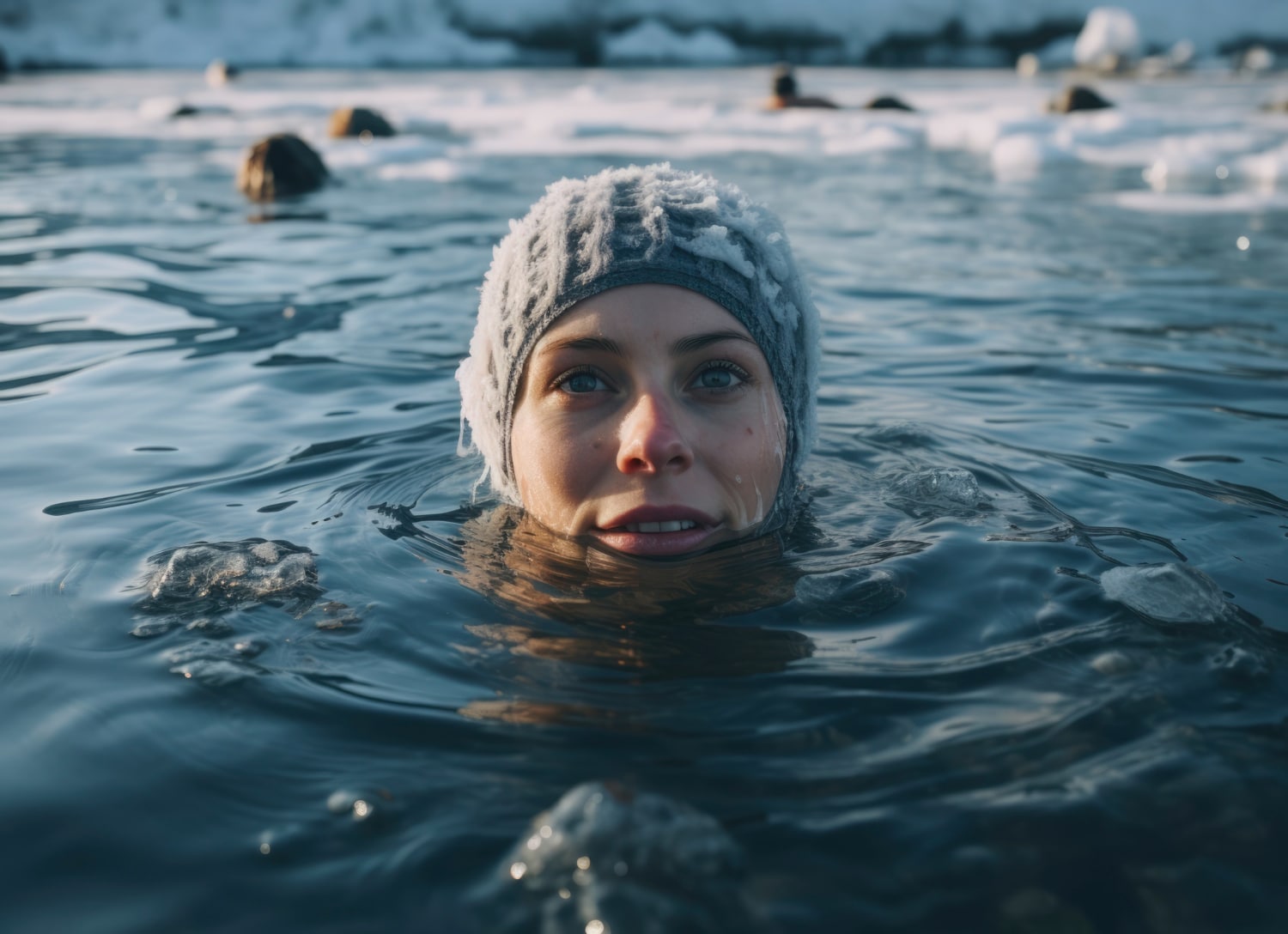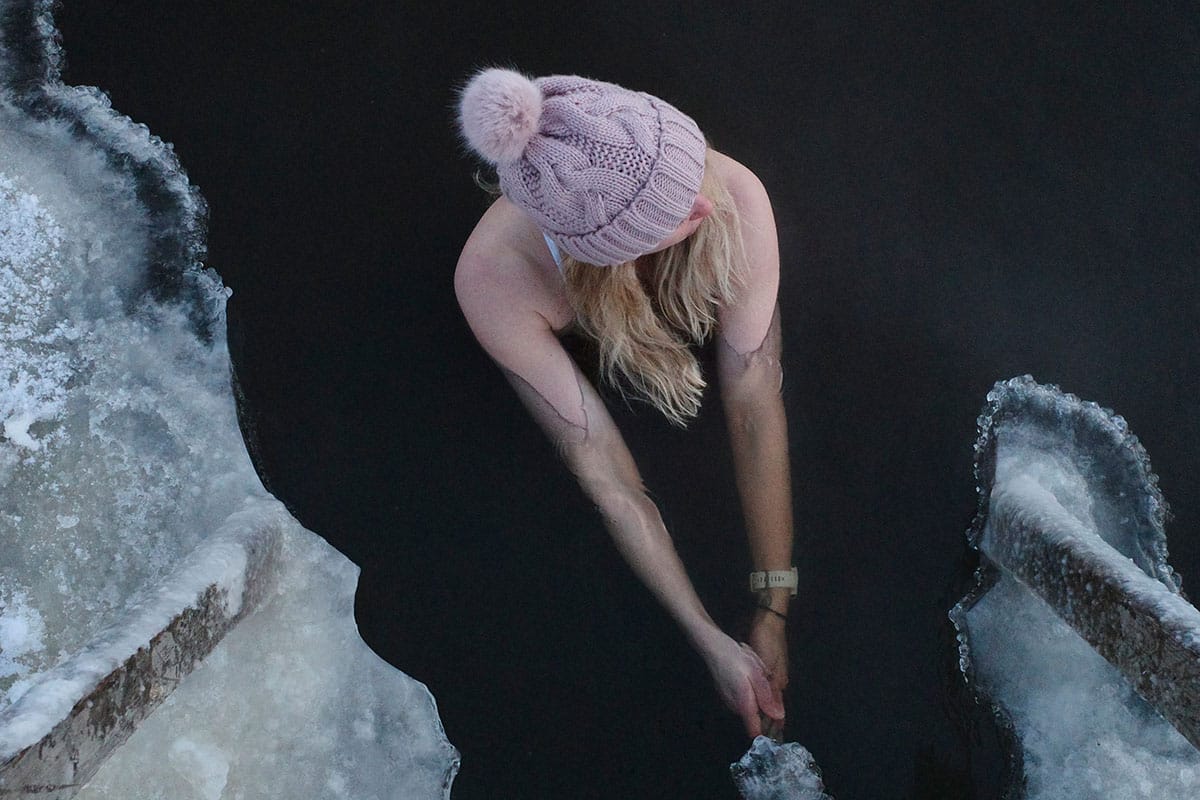The darker and colder months of the year offer an incredible opportunity to improve or strengthen your mental (and physical) health: cold water swimming! Due to its many benefits, cold water swimming has become somewhat of a trend over the recent years that is rapidly gaining more and more followers.
There are thousands of personal testimonials of what a powerful practice it is from those who have taken the plunge – some experiences being nothing short of life-changing. Science is slowly catching up and researchers have documented cases in which cold water swimming helped patients who struggled with chronic depression.
This blog post gives an overview of the various benefits of cold water swimming and explains why it is good for you. It also highlights some potential dangers to be aware of if you feel like giving it a try and makes suggestions on what gear you might find helpful when you are just getting into cold water swimming.
We do not offer cold water swimming as part of our program at New Life Portugal, although the breathtaking nature of the Serra da Estrela that we are surrounded by offers plenty of opportunities to explore cold water swimming on your own.
Health Benefits of Cold Water Swimming
Natural high
Cold water swimming activates the sympathetic nervous system and triggers your body to release beta-endorphins as well as other feel good hormones. These hormones help with pain relief and will leave you feeling euphoric. Scientists have found that the feel good hormone levels increase 2-fold to 3-fold and stay elevated for weeks after the cold water exposure.
Boosts immune system + improves circulation
Cold water swimming is not just fantastic for your cardiovascular as well as your lymphatic system (flushing out toxins) but also boosts your immune system. Exposure to cold water makes your body increase the production of white blood cells which play a key role in your immune system.
Another benefit is that you may end up with more radiant skin – especially if you take your plunge in the sea. Saltwater has antiseptic properties and can encourage the skin to heal. It is also rich in calcium, potassium and magnesium which are all good for your skin.
Helps with depression
Cold water swimming has been shown to improve the well-being of people suffering from asthma, rheumatism or fibromyalgia. And it can help with severe chronic depression. A case that stands out and has been studied by scientists is that of a 24-year old woman called Sarah.
She’d been on antidepressants since the age of 17 but to no avail. After the birth of her daughter, her goal became to be medication free and she was willing to try an unconventional route to fight her depression. She started a weekly practice of cold water swims that immediately improved her mood in the short term and gradually improved her mental health.
Eventually, she came off her antidepressants and was still medication-free a year afterwards. Personal stories like Sarah’s can be found all around the world. To back the positive effects of cold water swimming on general mental health up scientifically and understand them better, researchers in the UK are currently conducting several studies.
Decreases inflammation which provides pain relief
When exposed to the cold, your body’s arteries narrow. This provides relief from pain, helps with sore muscles and reduces inflammation. Cold water swimming also increases the number of leukocytes in your blood. Apart from helping your body fight respiratory infections, they also protect against inflammation. Because of this, science is considering cold water exposure as a “treatment of inflammation-related conditions” as well as to prevent inflammation.
Increases tolerance for stress
The cold of the water puts your body under significant stress. And that is actually a good thing because if you expose yourself to cold water on a regular basis your tolerance for stress increases. This includes mental and emotional stress as well. This is called “cross-adaptation”.
Professor Mike Tipton, a leading researcher in the field of cold water swimming, has observed that the human body’s shock response to cold water gets halved after just six plunges. A colleague of his, Dr Heather Massey, had volunteers take a dip in cold water before exposing them to a low-oxygen environment. They were able to cope much better with that physical stress than a control group that had not participated in the cold water exposure.
Boosts self-esteem
When you go for a swim in cold water, you are consciously choosing short-term discomfort for long-term gain on several levels. Your body will try to tell you to not immerse yourself in the cold water and overcoming this initial reaction will build your mental strength as well as resilience. It takes courage to do it once.
Making cold water swimming a regular practice will not only fill you with a sense of accomplishment every time you do it but also fill you with confidence that you can do hard things. Ultimately it’ll boost your self-esteem alongside all the other benefits.
Jump-starts metabolism which burns calories
Cold water swimming jump-starts your metabolism because your muscles will start tightening and relaxing, meaning you will shiver, in an attempt to warm up your body again. Creating heat through shivering costs energy. Your body is burning through quite a high amount of calories considering that you won’t be moving all that much as you can only stay in cold water for a relatively short amount of time.
Increases libido
Cold water has the reputation to help against some of our more primitive urges. However, the opposite seems to be true: Cold water swimming stimulates the production of oestrogen and testosterone and increases your libido. This may lead to feelings of higher self-esteem and more confidence.
Improves mental clarity, overall wellbeing as well as sleep
When you immerse yourself in cold water, your body goes into a high-alert state. It’ll blow the cobwebs out of your head and leave you feeling sharp and clear mentally. Cold water swimming also stimulates the parasympathetic nervous system which is responsible for the body’s rest and repair mode. Chances are, you’ll be left feeling relaxed and calm for hours after your dip and potentially sleep better at night.

Swimming in Cold Water Dangers
Depending on where you live and what’s available, you can swim in a lido or open water. If you opt to take your dip in the sea, a lake, stream, river, or under a waterfall, please be aware of the dangers and take the necessary precautions.
The sea can have dangerous currents – if you get caught in one, don’t panic! Swim to the side, never against the current and then try to get back to the shore once you have left it behind. If you feel you are becoming exhausted, choose to float rather than swim.
Open water can have rocks or plants under its surface that can cause injuries if you don’t tread carefully or might startle you. It is therefore best to only swim in a body of water that you know and to always have someone with you who can help or get help if anything should happen.
Do not jump into cold water! Your body’s involuntary shock response to the cold is a gasp. If your head is underwater, you will swallow some and might drown.
That being said, one of the biggest dangers of cold water swimming is hypothermia. Our bodies operate between 36.5 and 37.5°C. If your core body temperature drops to 35°C, you are considered clinically hypothermic. This can be life-threatening. Signs of hypothermia are:
– Difficulty to coordinate your movements – which is for obvious reasons extremely dangerous when swimming in open water;
– Mental confusion;
– Slurred speech.
If you notice any of these signs in yourself or whoever you are swimming with, leave the water immediately and start the rewarming process.
You always want to have a towel and dry, warm clothes – including a winter hat, gloves and thick socks – waiting for you as well as ideally a hot drink (take a thermal cup). Dry off and dress as quickly as you can once you leave the water. Shivering is a normal and healthy response of your body to try and warm you up again.
Be aware that your body will continue to cool for another 20 to 30 minutes after you exit the water. That means that your core body temperature will continue to drop and be at its lowest at around 20 to 30 minutes after your swim. Warming up is therefore vital. It can help to keep moving by walking briskly or doing some jumping jacks.
Cold Water Swimming Gear
Cold water swimming is extremely inexpensive or even free – depending on where you do it. You also don’t necessarily need any fancy gear. A swimming costume and a towel are fine.
Swim shoes/neoprene socks and gloves can provide an extra bit of warmth and protect your hands and feet from sharp rocks and stones underwater.
Some people might choose to buy a wetsuit. It can enable you to stay in the water for a bit longer. It won’t take away from the initial cold, though, as it takes a few moments for the water between your body and the suit to warm up a little. A wetsuit is by no means essential to enjoy cold water swimming, though.
Whereas our bodies generally adjust really well to heat and cold, it’s hard to adjust the temperature via our blood flow above the neck. We end up losing a lot of heat through our heads. It is therefore greatly beneficial to wear a hat when swimming or at least to put one on as soon as you leave the water

Cold water swimming at New Life Portugal
Our holistic and integrative approach to health and overall wellbeing very much incorporates the bounty of the nature that surrounds New Life Portugal alongside the wide range of therapeutic modalities we offer as a modern wellness retreat and recovery centre.
Our highly skilled and experienced therapists, coaches and teachers will guide and support you on your journey to cultivate sustainable wellbeing.
At New Life Portugal we are extremely lucky to be surrounded by the stunning nature of the Serra da Estrela. Our facility is embedded in this exceptionally beautiful natural park that is rich in diverse open water sources.
They range from streams over waterfalls to lakes and offer you the opportunity to experience the benefits of cold water swimming while being surrounded by striking mountain ranges and deep forests.
Please note that even though we have an outdoor swimming pool which you can enjoy at your leisure, New Life Portugal does not offer cold water swimming as part of the program.
You are, however, more than welcome to venture into the surrounding nature and explore this practice on your own or with likeminded fellow community members.